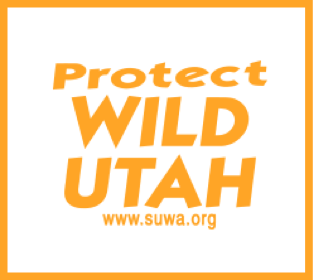|
FOR IMMEDIATE RELEASE CONTACT: SUWA: Stephen Bloch, 801-486-3161 ext. 16 Court Ruling Blocks Oil Exploration Near Arches National Park WASHINGTON (December 23, 2002) In response to a lawsuit by four environmental organizations, a federal court late last Friday blocked the Interior Department from allowing oil exploration in thousands of acres of public wildlands on the eastern boundary of Utah’s Arches National Park. The Interior Department’s Bureau of Land Management (BLM) now will have to complete a proper environmental review before authorizing energy companies access to the area. (For a pdf file copy of the decision, contact NRDC.) This is the first time a federal court has had the opportunity to review a Bush administration-sponsored oil exploration project. Environmentalists expect it will put a brake on the administration’s rush to open up Western public lands to energy development. “This decision sends a strong message to the Bush administration: You have to obey the law,” said Stephen Bloch, an attorney with the Southern Utah Wilderness Alliance (SUWA), one of the plaintiffs in the case. “The administration now will have to reconsider its cavalier approach to environmental review and public participation.” SUWA, along with NRDC (Natural Resources Defense Council), The Wilderness Society and the Sierra Club filed suit to stop the project in late September in federal court in the District of Columbia. BLM had approved a request by the world’s largest seismic exploration company, WesternGeco, to explore for oil and gas in the Dome Plateau region just outside of Moab, Utah, also known as the Yellow Cat 2-D Swath project area. The project area encompasses more than 23,000 acres of scenic wildlands popular with hikers, mountain bikers and other outdoor enthusiasts. The region also provides habitat for several threatened or endangered species, including the black-footed ferret, the bald eagle and the Mexican spotted owl. In late October, the court issued a preliminary injunction temporarily blocking the WesternGeco project so that it could consider the environmental groups’ claims. Last Friday, the court agreed with the environmental groups that BLM, by approving the exploration activity, violated the National Environmental Policy Act (NEPA). Attorneys for the groups successfully argued that BLM relied on an inadequate Environmental Assessment that failed to demonstrate there would be “no significant impact” on the human environment. To the contrary, they noted that WesternGeco would have used 60,000-pound “thumper trucks” crisscrossing sensitive desert soils, vibrating the ground at regular intervals to record seismic information about oil deposits. Thumper trucks ravage soil, causing such ecological damage that it could take as many as 300 years for the desert to recover. “The Bush administration can’t hand over our most sensitive wild lands without properly reviewing the potential environmental consequences and giving the public a say,” said Sharon Buccino, an NRDC senior attorney. “In this case, the court ultimately recognized that the Interior Department’s action would have caused lasting damage to Utah’s canyon lands.” The Bush administration has been pushing federal land managers to fast-track development on public lands across the West allegedly to bolster U.S. energy security. Last year, BLM released a blueprint memo outlining a strategy to open up public lands for oil and gas exploration and drilling. In another memo, released earlier this year, BLM told federal land managers in Utah that oil and gas lease applications coming into the agency should be considered “priority number one.” Noting that BLM recently approved exploration by WesternGeco in Canyons of the Ancients National Monument in Colorado, Pamela Eaton, a regional director of The Wilderness Society, said, “Approving oil exploration and drilling in America’s most scenic wilderness landscapes has become a pattern at the Interior Department. These breathtaking public lands should not be cavalierly handed over to the energy industry.” BLM’s Utah decision is just one example of the Bush administration’s willingness to ignore NEPA, NRDC’s Buccino pointed out. Recently the administration also proposed to exclude logging, mining and grazing projects on federal lands, as well as sonar tests and waste dumping in the ocean, from NEPA requirements for environmental review and public participation. The environmental groups are represented by Bloch at SUWA, Buccino at NRDC, and Katherine Meyer at the Washington, D.C., law firm of Meyer & Glitzenstein. The Natural Resources Defense Council is a national, nonprofit organization of scientists, lawyers and environmental specialists dedicated to protecting public health and the environment. Founded in 1970, NRDC has more than 500,000 members nationwide, served from offices in New York, Washington, Los Angeles and San Francisco. More information is available at NRDC’s Web site, http://www.nrdc.org/. The Wilderness Society, which has 225,000 members and supporters, is a nonprofit organization dedicated to the creation of a nationwide network of wildlands through public education, scientific analysis and advocacy. Founded in 1935, The Wilderness Society’s goal is to ensure that future generations can enjoy the clean air and water, beauty, wildlife, and opportunity for spiritual renewal provided by the pristine forests, rivers, deserts and mountains owned by all Americans. The Sierra Club is a national conservation organization with more than 700,000 members. The club’s mission includes protecting and enhancing by all lawful means the natural resources and human environment of the United States and the Earth, and to explore, enjoy, and preserve those resources. Specifically, the club’s purposes include advocating responsible management of public lands resources in the state of Utah, and its Utah chapter has a long history of public education and advocacy to protect such resources. The mission of the Southern Utah Wilderness Alliance is the preservation of the outstanding wilderness at the heart of the Colorado Plateau, and the management of these lands in their natural state for the benefit of all Americans. SUWA formed in 1983 and has offices in Utah and Washington, D.C. For more information, go to SUWA’s Web site, http://www.suwa.org/. View related court documents (requires Adobe Acrobat Viewer) |
|
|

 Southern Utah Wilderness Alliance
Southern Utah Wilderness Alliance
Protecting Utah's Redrock Country
